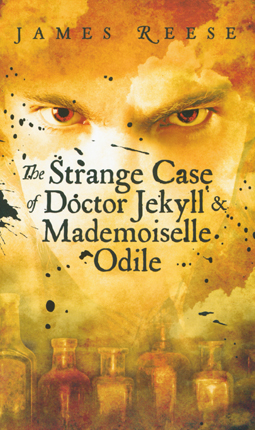Full Text Reviews: Booklist - 02/01/2012 The saying is true: behind every deranged, superstrong madman is a great woman. In this case, it’s 16-year-old Odile, who is making ends meet in 1871 Paris by selling rats for food and living with her sickly brother, Gréluchon, in underground catacombs. A chance meeting with kindly Dr. Jekyll leads to both siblings being ensconced in his mansion, where Odile uses the knowledge passed on from her witch ancestors to experiment in Jekyll’s lab with ways to heal Gréluchon. Jekyll gets an eyeful, of course, and soon enough Odile finds herself at an impossible crossroads: give to the newly born Mr. Hyde all of her secrets or risk losing her brother forever. Written in Victorian style—but not heavily enough to stymie teen readers—this book lacks the sense of horror found in Robert Louis Stevenson’s original, yet it is successful in spinning the familiar tale into one of war and romance seen from a female perspective. The secrets to the potion are quite unexpected, and the ominous ending hits an ambiguous note too rarely seen in YA novels. - Copyright 2012 Booklist. School Library Journal - 03/01/2012 Gr 9 Up—This prequel to the Stevenson classic centering on the duality of human nature imports the titular characters of Doctor Jekyll and Mister Hyde, along with Poole, the butler, to a besieged Paris during the Franco-Prussian War. The narrator, 16-year-old Odile, and her younger brother, Grél, seek refuge in the city after the brutal murder of their parents in the countryside. The teens are descended from Cagots, a people abhorred for their link to medicinal powers and witchery. They are reduced to peddling rats to starving Parisians while living in the dank, cold catacombs until a chance meeting with Jekyll and Poole. Grél's illness leads the teens to Jekyll's door where the doctor offers Odile full use of his laboratory so she can concoct a remedy for the boy, all the while spying on her research. Unlike the female characters in Stevenson's classic, Odile is a strong protagonist and a survivor. It takes some time, and plenty of foreshadowing, but she eventually uncovers the macabre source of the mysterious transforming salts. While the classic is often billed as a novella, this prequel is about three times its length, and perhaps just a tad too rambling. The fascinating historical backdrop, including food shortages and "The Bloody Week" of civil unrest, appears accurate and is well integrated with the plot. Teens studying Stevenson's work or students of history or the French language may find this novel of particular interest.—Patricia N. McClune, Conestoga Valley High School, Lancaster, PA - Copyright 2012 Publishers Weekly, Library Journal and/or School Library Journal used with permission. Bulletin for the Center... - 05/01/2012 Desperate to find a cure for her brother Grel’s mysterious progressive disease, Odile seeks help from the books left her by her late mother, a witch. The city of Paris, where they’re now living, suffers problems of its own in 1871: under siege by the Prussians, the citizens have been reduced to killing and eating the animals in the city zoo, which is where Odile has gone to test some magicked salts on the monkeys, with horrific results (the treated monkey turns monstrous and kills one of its fellows). She also runs into a young doctor named Jekyll, whose household she and Grel eventually join. Little does she know that Jekyll has been spying on her, so that when she does heal Grel, and in the process transforms him into a powerful, hulking, amoral male, Jekyll is watching. He steals her potions, which cause the famous transformation of Jekyll into Hyde, and she is forced to work with the doctor to discover the secret of the main ingredient. Setting his story against the backdrop of the Commune, a volatile period following France’s loss in the Franco-Prussian War, Reese captures the spirit of the period from multiple perspectives, including that of the rich foreigners who, though trapped in the city, experienced few of the devastating shortages that faced the common folk. Odile’s increasing desperation and self-recriminations are in keeping with her character, but they become somewhat tedious and overblown, and her excessive pronouncements of despair drag on the pace. Some plot threads are left dangling, but this explanation of the mysterious ingredient that animates Jekyll’s transformation is well suited to readers who enjoy period drama laced with a bit of tame horror and not-so-tame blackmail. KC - Copyright 2012 The Board of Trustees of the University of Illinois. Loading...
|



